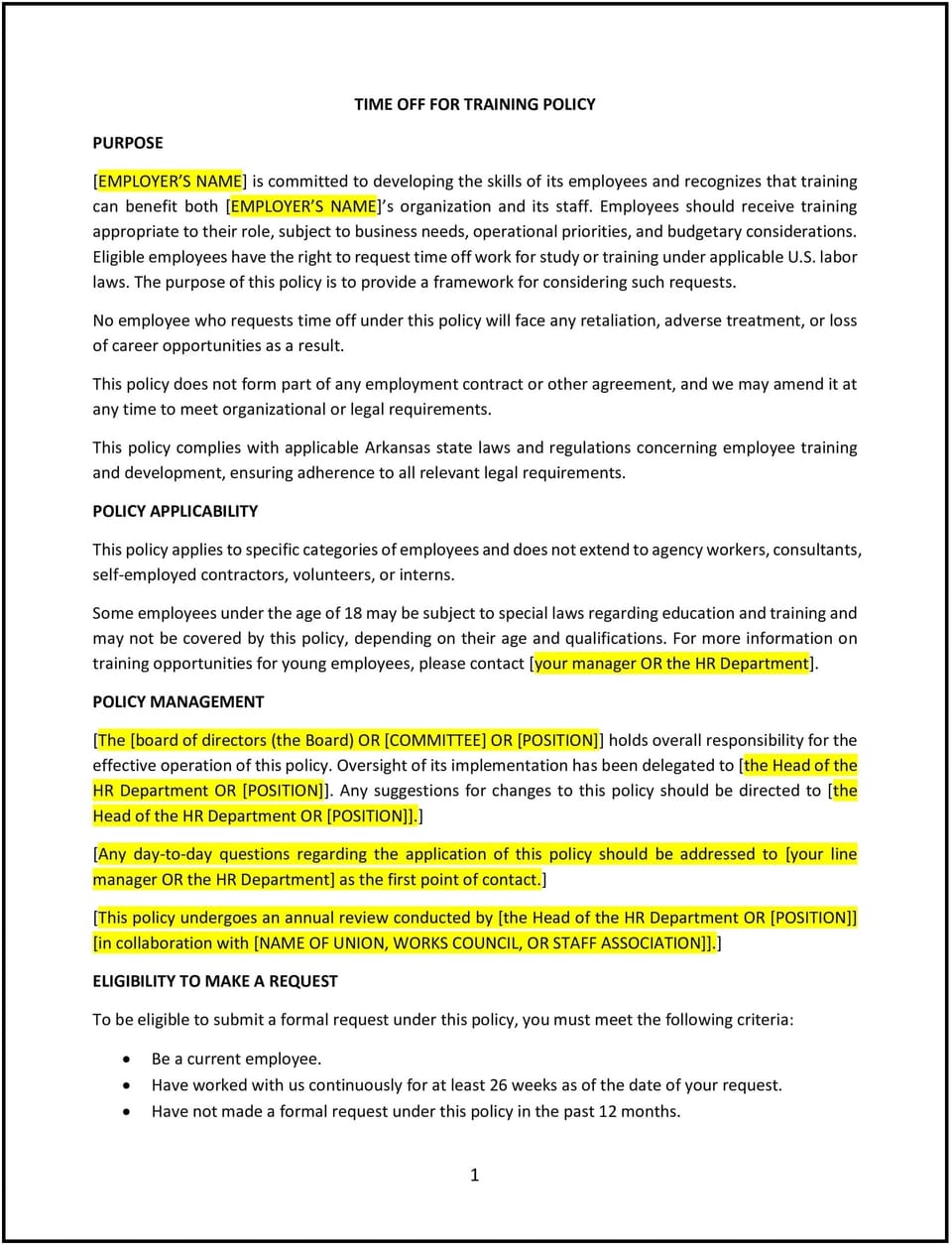Time off for training policy (Arkansas): Free template

Time off for training policy (Arkansas)
In Arkansas, a time off for training policy provides businesses with guidelines for managing employee absences related to professional development and training opportunities. This policy ensures employees can enhance their skills and knowledge while balancing workplace productivity and operational needs.
This policy outlines eligibility, procedures for requesting training leave, and the terms under which such time off is granted. By implementing this policy, Arkansas businesses can invest in employee growth while maintaining consistency and fairness.
How to use this time off for training policy (Arkansas)
- Define eligible training: Specify the types of training programs covered under the policy, such as job-related certifications, workshops, or continuing education.
- Establish request procedures: Provide clear steps for employees to request time off for training, including notice periods and required documentation.
- Clarify leave terms: Outline whether training leave is paid or unpaid and whether costs for training are covered by the business.
- Communicate expectations: Ensure employees understand their responsibilities, such as providing proof of attendance or demonstrating how the training benefits their role.
- Document approvals: Maintain records of all training leave requests and approvals to ensure transparency and consistency.
Benefits of using this time off for training policy (Arkansas)
This policy offers several advantages for Arkansas businesses:
- Promotes skill development: Encourages employees to pursue professional growth, enhancing their contributions to the business.
- Supports compliance: Aligns with Arkansas labor laws and industry best practices for employee development.
- Enhances employee retention: Demonstrates the business’s commitment to investing in employee growth and career advancement.
- Protects workplace productivity: Establishes clear procedures for managing workloads during training-related absences.
- Builds accountability: Provides guidelines for employees to justify the relevance and benefits of requested training opportunities.
Tips for using this time off for training policy (Arkansas)
- Address Arkansas-specific considerations: Reflect any state labor laws or industry-specific practices related to training leave.
- Communicate opportunities: Regularly inform employees about available training programs or business-supported development initiatives.
- Plan for absences: Develop strategies to manage workloads during employee training, such as redistributing tasks or scheduling training during low-demand periods.
- Encourage feedback: Request post-training feedback from employees to assess the value and applicability of the training to their roles.
- Update regularly: Revise the policy to reflect changes in training opportunities, business needs, or workforce expectations.
Q: How does this policy benefit the business?
A: This policy supports employee skill development, improves workplace performance, and demonstrates the business’s commitment to professional growth, enhancing retention.
Q: What types of training are eligible under this policy?
A: Eligible training includes certifications, workshops, or education programs directly related to the employee’s job or career advancement within the business.
Q: How does this policy support compliance with Arkansas laws?
A: The policy incorporates best practices for employee training and development while adhering to state labor regulations.
Q: What documentation should employees provide when requesting time off for training?
A: Employees should submit details about the training program, such as course descriptions, schedules, and proof of enrollment, as outlined in the policy.
Q: How can the business manage workloads during training leave?
A: The business can redistribute tasks, adjust schedules, or cross-train team members to maintain productivity during employee absences.
This article contains general legal information and does not contain legal advice. Cobrief is not a law firm or a substitute for an attorney or law firm. The law is complex and changes often. For legal advice, please ask a lawyer.


